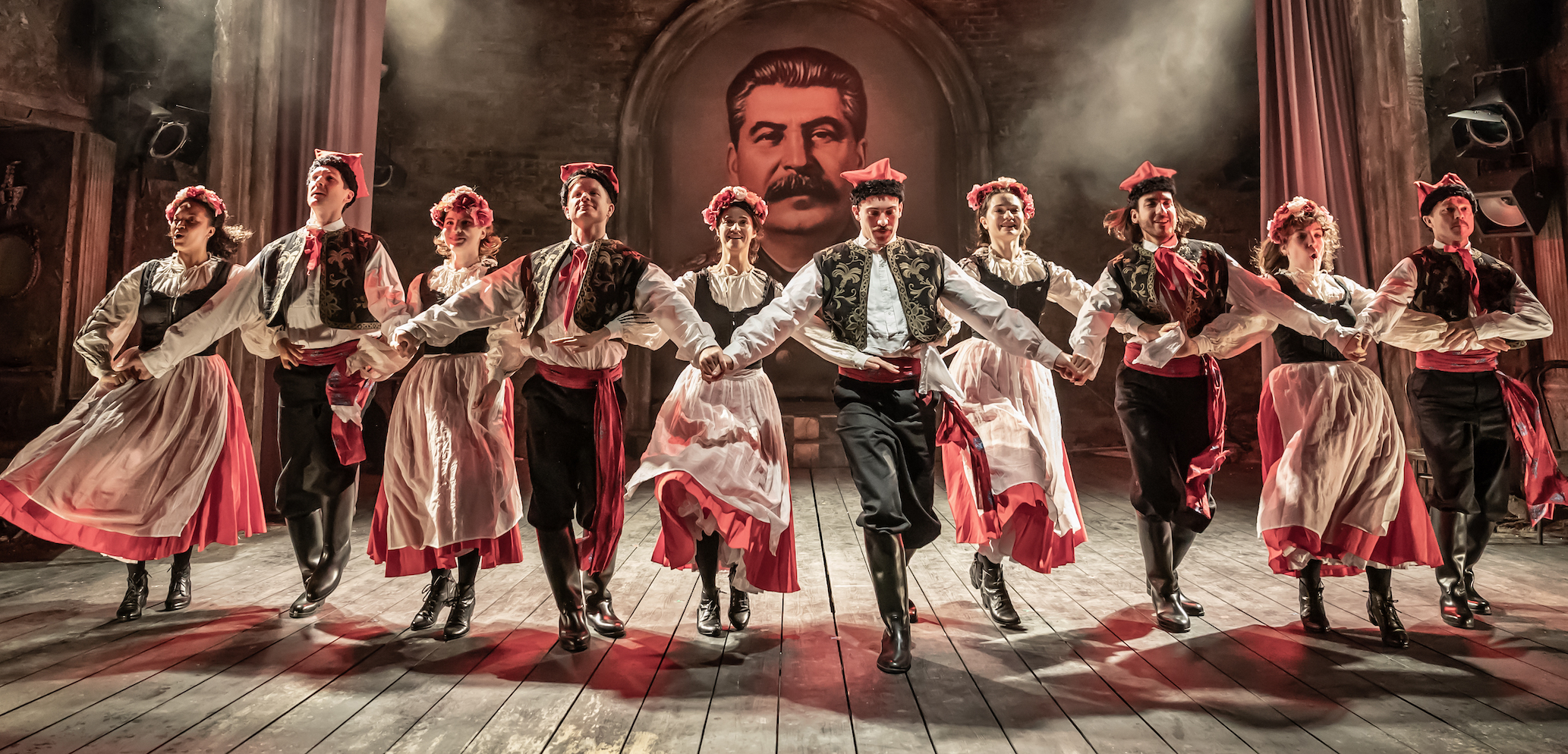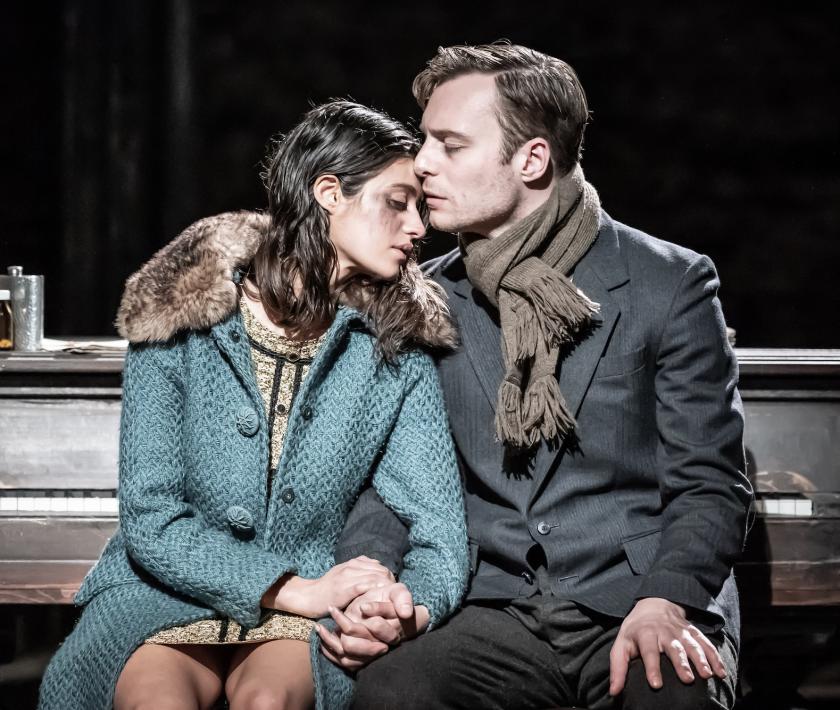There’s a touch of Dr Zhivago about director Paweł Pawlikowski’s screenplay for his 2018 film Cold War. Its plot is driven by the same Lara/Yuri dynamic, of an overwhelming love affair trying to outflank the forces of history. Now it's been adapted at the Almeida as a play-with-music by Conor McPherson, with lush songs by Elvis Costello, directed by Rupert Goold. It’s not remotely Christmassy, though offers a gift of no ordinary kind.
The Polish lovers who consistently find themselves confronting the fault line dividing post-war Europe are Wiktor (Luke Thallon) and Zula (Anya Chalotra). At the start, Wiktor is a musical purist, a pianist-composer trained in Warsaw who is now gathering folkloric materials in the Polish countryside with a lover, Irena (Alex Young), overseen by a functionary from the communist party (Jordan Metcalfe). Into one of their recording sessions comes Zula, whose motives for auditioning are probably mercenary. But she has a strong voice and a certain something; the dance moves, as she dismissively points out, she can easily pick up.
Wiktor is smitten. He stays with the touring troupe even after Irena is cast aside for refusing to compromise the artistic aims of the project. She argues that the cultural heritage these songs provide, even if every drunk peasant sings them, are all they have to cling onto now. But the official in charge wants a showcase for the virtues of important Soviet exports such as Land Reform and agricultural machinery. Zula and Wiktor strike up an almost screwball, argumentative relationship, she feisty and down to earth, he able to escape reality in a Chopin nocturne, but both insanely in love.
It seems as if Zula is being set up as the “new” post-war Poland, a strong woman going flat out in survival mode, even if it means dressing up in national costume for the troupe’s shows, where a giant portrait of Stalin becomes the backdrop. She is also having to fend off Kaczmarek (a suspiciously avuncular Elliot Levey), the troupe’s manager, an arch ducker-and-diver. Wiktor’s dreams, though, do not involve writing songs about tractors, and he devises a plan to walk with Zula across the border into West Berlin when the troupe visits the city. (This is in 1952, when such things were still possible.)
When Zula doesn’t join him, the wheels are set in motion for their romance to stop and start, jerked between Soviet conformity and Western "imperialism". Wiktor is initially embedded in bohemian life in Paris, Zula marries an electrician from Palermo, a move she claims to have made purely because it allows her to travel legally outside the USSR and search for Wiktor. But the stakes grow higher, the sacrifices more cruel, for would-be travellers across the eastern bloc’s borders. Zula emerges as the more committed to her cultural heritage and less enamoured of the dog-eats-dog West. And, in her way, also more heroic.
The poignancy of this love affair is underpinned by beautiful music of all kinds: the simple a cappella duetting and stirring choruses of Poland’s folk tradition – hats off here to the Warsaw Village Band’s contributions –with great dancing to match (choreography by Ellen Kane), but also the winsome melodies and punchy lyrics Elvis Costello seems to have on tap. One song, I Do (Zula’s Song), a wistful number about going to a crossroads that threads its way through the piece from the outset, is a signal to those who loved the film that this adaptation is not going to fudge its plot.
 The rural scenario described in that song is not one the staging attempts to replicate, thankfully. The unadorned space is set up to hold a curtained stage withiin a stage for the troupe’s shows and Zula’s later solo performances. There's a baby grand on wheels that's often centre-stage and rickety furniture to the side, all in a dreary, crusty dark-grey/brown, with occasional appearances of a mobile platform (the impressive design is by Jon Bausor). Paule Constable’s subtle lighting adds to the “distressed” feel, and in one memorable concert scene, provides a spotlight effect in which the thick dust motes are almost palpable.
The rural scenario described in that song is not one the staging attempts to replicate, thankfully. The unadorned space is set up to hold a curtained stage withiin a stage for the troupe’s shows and Zula’s later solo performances. There's a baby grand on wheels that's often centre-stage and rickety furniture to the side, all in a dreary, crusty dark-grey/brown, with occasional appearances of a mobile platform (the impressive design is by Jon Bausor). Paule Constable’s subtle lighting adds to the “distressed” feel, and in one memorable concert scene, provides a spotlight effect in which the thick dust motes are almost palpable.
McPherson’s adaptation is 100% faithful in patches, taking whole passages of dialogue from the film. But he also fleshes out characterisation with chunks of his own devising, giving Wiktor, for example, a long speech to Zula about an older lover he abandoned in his youth, an act of cowardice that has preyed on him ever since. He may or may not be an informer, even a one-time Nazi collaborator: all McPherson innovations. (Informing is standard in this society, and Zula openly indulges in it.) What Zula does to save Wiktor from lengthy imprisonment is also tweaked, in a rather unhelpful way. These changes make the main characters less enigmatic – and less surprising – than their counterparts in the film, especially Wiktor, who emerges as a weaker man, not just a man made vulnerable by passion.
These quibbles will matter not a jot to those who haven’t seen the film. The two leads are still engaging opposites in a heartbreaking relationahip: Chalotra, a Carmen type, moody but direct and purposeful, who as a singer is unafraid to pursue Costello’s vocal lines up the stave; Wiktor, a gently teasing lover but a diffident, sensitive man with a melancholy core, who can’t pursue the musical life he thought he would have, let alone the woman he wants to be with. Nightclub jazz and film scores are his lot now, whores his drunken solace.
Light relief comes from Levey’s almost music-hall comicality; whereas Irena is looking to record songs about pain and humiliation, he wants the music of victory. (Zula shows her modernity by choosing an audition song from a Russian movie.) McPherson has also added some dumb American producers as backers of the French film Wiktor is scoring, loud and blowsy types who try to rewrite his music and liken Wiktor to “Sho-pan”. It’s a bit cheap, as are the jibes about his film not being understandable as it’s French.
What the piece forcefully communicates, though, is the serious pain of statelessness and of not knowing where you belong, a sadly perennial theme. It gives the couple’s romance a bittersweet kick, without destroying its tenderness.















Add comment